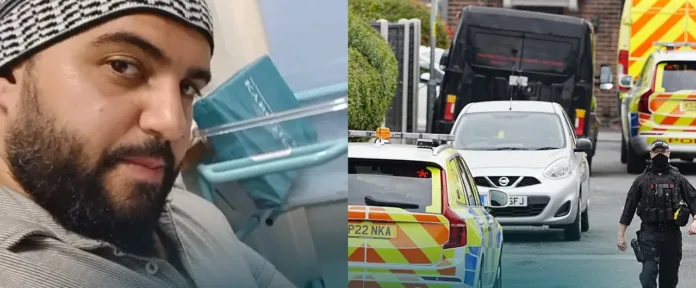Behind the calm exterior of a “normal” neighbour lay a secret life of debt, crime and radicalisation
To neighbours, Jihad al-Shamie was just another face on a quiet suburban street, a new father, a man who lifted weights in his front garden, and sometimes parked badly. But the 35-year-old, shot dead after carrying out a deadly antisemitic attack at a Manchester synagogue, lived a far darker life than anyone imagined.
Al-Shamie’s story begins innocuously enough. Born and raised in Manchester, he seemed to enjoy a comfortable childhood with his two younger brothers. Home videos from the 1990s show him cuddling a cat in the garden, giggling as he pushes his brother on a swing. Days out at Camelot theme park, Chester Zoo and the Trafford Centre painted the picture of a typical, happy British family.
His father, Faraj al-Shamie, was a respected trauma surgeon who worked in some of the world’s most dangerous conflict zones — Iraq, Afghanistan, and South Sudan, with the International Committee of the Red Cross. His dedication to saving lives stood in tragic contrast to his son’s path.
Neighbours who knew the family in those early years recall nothing out of the ordinary. “They were just a nice family,” said Brian Smith, 78, who lived opposite them. “Jihad was a normal little boy. I don’t know what happened to him.”
By adulthood, however, something had changed. The family moved to a semi-detached house in Prestwich about 15 years ago, and those who saw Jihad around the neighbourhood described him as quiet, even dull, “a straightforward, ordinary lad,” one neighbour said. Yet behind that façade, his life was unravelling.
Records show al-Shamie was unemployed and bankrupt, resorting to a debt relief order in 2024 while still living at his parents’ home. His father’s Facebook posts from late that year show him cradling a newborn, his first grandchild — a moment that, for a time, appeared to suggest stability.
But in reality, al-Shamie was spiralling. The Guardian revealed he was on police bail for rape at the time of his attack on Heaton Park Synagogue, where he ploughed a black Hyundai into worshippers before lunging at them with a knife on Yom Kippur. Two people died, and three others were injured before he was shot dead by police.
Police say he had a criminal record for minor offences, but was not previously known to counterterrorism officers. That changed on the night of the attack, when his violent rage and apparent extremist motives came into focus.
His father, devastated by the events, released a public statement disowning his son’s actions. “The Al-Shamie family strongly condemns this heinous act targeting peaceful, innocent civilians,” he wrote. “We fully distance ourselves from this attack and express our deep shock and sorrow. Our hearts and thoughts are with the victims and their families.”
Investigators are now combing through al-Shamie’s online history and phone data to trace his radicalisation. They believe he had grown increasingly fixated on conflicts in the Middle East, particularly Gaza, over the past few years.
An X account believed to belong to him featured a machinegun as its profile image, a white flower, and what appeared to be a copy of the Qur’an. Its only visible post referenced the 2016 bombing of Manbij, Syria, calling on God to “stand up against those who wronged and killed them”.
Despite his extremist leanings, those who saw him in daily life never suspected anything. “He was just a bit odd,” said one local resident. “Lifted weights, didn’t talk much. Nothing that made you think he was capable of that.”
It now appears that beneath the quiet exterior of a bankrupt tutor and new father was a man consumed by anger, failure and grievance — one whose descent into hatred ended in bloodshed on the holiest day of the Jewish calendar.
As Manchester reels from the attack, the question investigators are racing to answer is not just how he acted, but why — and whether anyone saw it coming.
